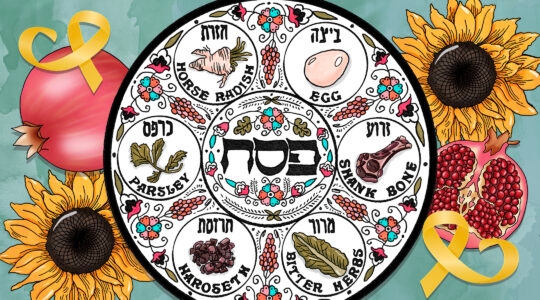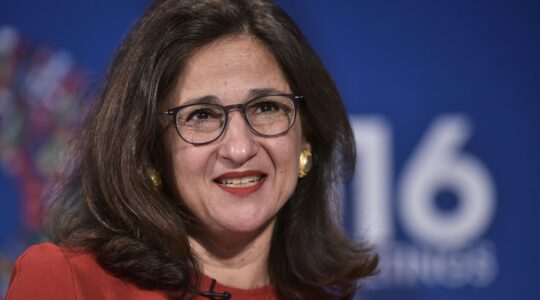NEW YORK (JTA) – In 1985, Robert Bellah co-authored a book titled “Habits of the Heart: Individualism and Commitment in American Life,” which highlighted the centrality of personal autonomy and individual choice in the United States. As an example of this widespread phenomenon, he described a nurse, Sheila Larson, who “has actually named her religion (she calls it her ‘faith’) after herself.”
In her words, “My faith has carried me a long way. It’s Sheilaism. Just my own little voice.” In describing her Sheilaism, she says: “It’s just try to love yourself and be gentle with yourself. You know, I guess, take care of each other. I think He would want us to take care of each other.”
Over 20 years later, “Sheilaism” continues to characterize American social and religious life. The Jewish community is not unaffected by this phenomen, which continues into the 21st century. In fact, research continues to show that Jews are at the forefront of this trend in America, more than members of any other major religious group.
“Jews were considerably more privatized than either Protestants or Catholics,” contemporary American sociologists of religion Bruce Greer and Wade Clark Roof reported in a 1992 study published in the Journal for the Scientific Study of Religion.
[photo rabschac align=right]
In other words, a higher percentage of Jews determined what Judaism meant to them than Catholics determined what Catholicism was for them and Protestants what Protestantism was for them. Jews are most likely to exercise their freedom of choice in defining the substance of their religion.
This notion was sharply highlighted in an important book published in 2000 by Steven M. Cohen and Arnold Eisen, “The Jew WIthin: Self, Family and Community in America,” which analyzed current trends in the American Jewish community:
The principal authority for contemporary American Jews, in the absence of compelling religious norms and communal loyalties, has become the sovereign self. Each person now performs the labor of fashioning his or her own self, pulling together elements from the various Jewish and non-Jewish repertoires available rather than stepping into an “inescapable framework” of identity – familial, communal, traditional – given at birth.
Decisions about ritual observance and involvement in Jewish institutions are made and made again, considered and reconsidered, year by year and even week by week. American Jews speak of their lives, and of their Jewish beliefs and commitments, as a journey of ongoing questioning and development. They avoid the language of arrival. There are no final answers, no irrevocable commitments.
There are no longer any norms that are compelling, there are no loyalties, no fundamental givens. “The sovereign self” reigns supreme, religious involvement is a journey, and each Jew decides for her or himself what Judaism means.
It is in the context of this reality that the General Assembly of the United Jewish Communities convenes in Nashville this year. We are blessed by the multiplicity of choices America affords us, and we are also challenged by them. How can we, the representatives of a united Jewish community, inspire the millions of Jews not represented at the G.A. to engage meaningfully and seriously in the Jewish community?
Two or three generations ago, our challenge – and obligation – seems to have been more clearly defined. New immigrants needed to be integrated into American society; endangered Jewish populations around the world needed to be rescued; a vulnerable and beleaguered Israel needed to be strengthened and supported; vigilance in combating anti-Semitism needed to be exercised; the trauma of the Holocaust and its aftermath needed to be addressed.
But today is different. While some of these Jewish communal agenda items still are relevant, we face an additional challenge. For us the problem is not how to adjust our people to the manners and mores of society, but how to keep them from vanishing into the abyss of that society.
We have come a long way from 1969, almost 40 years ago, when a group of young Jewish activists forced their way into the G.A. of what was then the Council of Jewish Federations to demand greater investment in Jewish education, to chastise the Jewish establishment for being insufficiently Jewish in its priorities.
Our collective communal priorities have indeed shifted to appreciate the importance of insuring “Jewish continuity” by allocating significantly more communal dollars in support of day schools and adult Jewish learning. But more work remains to be done to inspire so many more to engage with us in the exciting powerful drama, beauty and meaning of Jewishness.
In a word, I would say that today we face a challenge of balance: balancing family and careers, balancing work and play, balancing engagement with the universal elements of American culture with the unique content of our Jewish commitments. And particularly as leaders of the American Jewish community, balancing local priorities and national and international needs.
Our rabbis teach us that there is a hierarchy to charity. “Aniyei irkha kodmin” – “the poor of your city take priority” – but the poor of other cities also have a claim on our charity dollar as do broader national and international Jewish concerns.
It is here, in this context, that we most appreciate the vital importance of the umbrella organization now called the United Jewish Communities. Who else has the larger picture in mind but the UJC? Who else can mount an effort to rescue endangered Jewish populations around the world but the UJC? Who else can generate substantial political and economic support for a besieged and beleaguered Israel but the UJC?
As valuable as personal giving and individual volunteerism is, engagement with the broader agenda of the Jewish people is also important. Although a cliche, there is much truth in the phrase: The whole is greater than the sum of its parts.
Rabbi Dr. Jacob J. Schacter is the scholar in residence for the 2007 General Assembly. A leading voice in the modern Orthodox movement, he is the university professor of Jewish history and Jewish thought and senior scholar at the Center for the Jewish Future at Yeshiva University.





